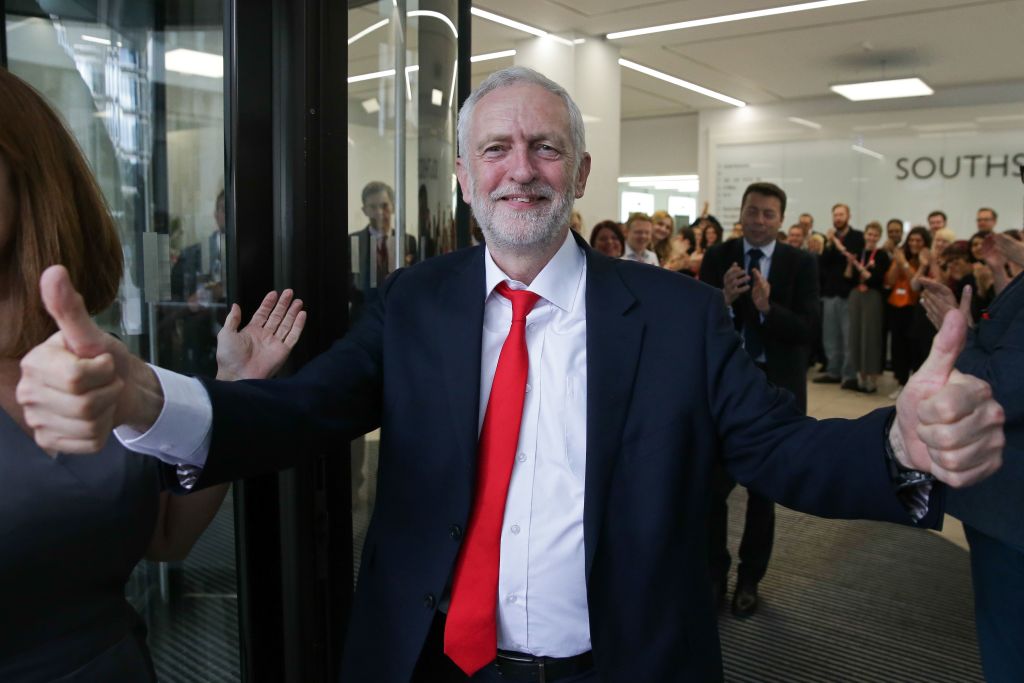Normally after an election, the leader of the party that came second comes to the first meeting of their parliamentary party and promises an inquiry into what went wrong. As Katy reported from the Parliamentary Labour Party meeting last night, no such thing happened when Jeremy Corbyn spoke to MPs. He received a standing ovation from all but two members, and the tone of the meeting was very much about how well Labour had done.
This is the dominant narrative: that Labour basically won the election by gaining seats, and the Tories lost it even though they remain the largest party. Politically, of course, Theresa May has lost: it was her decision to call an election and her campaign that cost the Tories seats. But Labour still didn’t ‘win’ in any meaningful sense beyond the fact that it massively exceeded expectations.
Corbyn did tell MPs last night that there would be an analysis of the demographic that Labour particularly struggled with. But this is quite different to the mammoth and multiple inquiries that the party has held in recent years into what prevented it from entering government.
This has led to some private consternation among centrist Labour MPs who have spent the past two years predicting that Labour would lose badly under Jeremy Corbyn. They were wrong about that: he did better than Ed Miliband, who they largely kept quiet about. And so even though they might be right in their assessment of the party’s ability to actually win an election, they realise that they have no credibility to make any predictions in public.
These MPs’ private worry is that Labour might be able to gain seats as it did last week, but it is still unable to win an election. ‘I basically fought my entire campaign by telling voters we wouldn’t be in government so it was safe to back me,’ says one MP who held on. ‘But next time people are going to be looking at Jeremy Corbyn as a potential Prime Minister and then we’re going to get destroyed.’
‘This was an election in which voters didn’t want either of us in power, hence the hung parliament,’ argues one leading member of the movement against Corbyn, adding that it would surely make the case for a centrist force in politics, not a more confident lurch left.
Another colleague is astounded that no-one has seen the parallels between Labour’s 2017 result and the way the Lib Dems also managed to attract students in 2010 by promising to abolish tuition fees. Both promises were made by parties not expecting to be in government, but the failure of the Lib Dems to stick to their promise when they found themselves in the Coalition destroyed the party in 2015.
‘I talk to Tories and they are staring into the abyss,’ says one MP who returned to Parliament this week. ‘But they are doing something about it. We are actually in the abyss already and are doing nothing. They are trying to defenestrate their leader – and she won. We gave our leader a standing ovation – and he lost.’
But frankly, to point this out in public would make the ‘moderates’ appear like a religious sect that, having unsuccessfully predicted the end of the world, gets up the following day to put on its sandwich boards foretelling doom once again. They failed to beat Corbyn in 2015. They failed to remove him in 2016. They failed to predict Labour gaining seats – or indeed that many of them would hold onto their own seats – in 2017. What terrifying story of a big electoral wolf might they spin to their party next? No matter if the wolf does this time turn out to be real: no-one is going to listen to them.
And MPs know that. ‘Everybody is knackered, no-one is listening,’ says one MP. ‘We really struggled outside metropolitan areas but what’s the point in warning that we could lose those seats? It won’t help.’
Corbynsceptics have wondered amongst themselves how they can challenge the narrative that Labour won, but have largely concluded that they can’t even do that because they will look as though they are being sour. Instead, they need to work out how to deal with a deluge of messages from Corbyn supporters demanding that they apologise for the statements they made about the leader before the election – and that they pledge loyalty to the leader from now on. It’s not something Corbyn himself did with Tony Blair, but it’s also not unreasonable for the current Labour leader’s allies to demand a little more respect from those who were so utterly wrong about him.
Some of them have done this publicly. Liam Byrne last night gave a speech at the PLP meeting in support of Corbyn, saying he had been to rallies and seen how effective the Labour leader had been. Chuka Umunna made similar comments. Others are keen to offer praise, having only weeks ago told their voters that Corbyn wouldn’t be Prime Minister. Ben Bradshaw, who returned as MP for Exeter with a 16,117 majority, says:
‘I take my hat off to Jeremy on a fantastic campaign and what I think for most people was a wholly unexpected result. I now hope very much he will use the new power a hung parliament confers on him to help Britain avoid the Tories’ extreme damaging Brexit and show he’s a Prime Minister in waiting who can win Labour the next election.’
Bradshaw was the only centrist MP The Spectator spoke to who wanted to go on the record about the result. The rest have decided that even though they have plenty to say about what they learned from the election campaign, no-one wants to listen.







Comments